You’re likely no stranger to the importance of saving money, especially in today’s economy. With rising costs and uncertain financial futures, adopting a frugal lifestyle is more vital than ever. But where do you start?
By implementing a few simple yet effective strategies, you can drastically reduce your expenses and increase your savings. From cutting back on subscription services to reducing household energy bills, there are numerous ways to live more frugally. But what are the most effective secrets to saving money in 2024, and how can you start applying them to your own life?
In A Nutshell
- Build an emergency fund covering 3-6 months of living expenses to avoid financial stress.
- Cancel credit card fees by reviewing statements, negotiating with issuers, and switching to fee-free cards.
- Reduce household energy bills by conducting an energy audit and upgrading to energy-efficient appliances.
- Grow your own food using container gardens or vertical layouts to save money on groceries.
- Declutter and sell unwanted items to achieve financial goals and reduce waste.
Start a Savings Emergency Fund

To shore up your financial security, building an easily accessible savings emergency fund should be a top priority.
This fund serves as a safety net, providing you with a financial cushion in case of unexpected expenses or income disruptions. When creating your emergency fund, crucially, you need to determine your emergency allocation – the amount you need to cover three to six months of living expenses.
To calculate this amount, consider your monthly essential expenses, such as rent/mortgage, utilities, and groceries.
Multiply this number by the number of months you want your emergency fund to cover. Set specific savings goals, breaking down your target into smaller, manageable amounts. This will help you stay on track and motivated.
Consider opening a separate, high-yield savings account specifically for your emergency fund.
This will keep your savings separate from your everyday spending money and earn you a higher interest rate. By prioritizing your emergency fund, you’ll be better equipped to handle life’s unexpected twists and turns, and you’ll be one step closer to achieving long-term financial stability.
Cut Back on Subscription Services
One of the easiest ways to free up money in your budget is to cut back on subscription services.
You’re likely paying for services you don’t use or need, and these costs can add up quickly. To identify areas where you can cut back, perform regular service audits to assess your subscriptions.
- Track your subscriptions: Make a list of all your subscription services, including streaming services, gym memberships, and software subscriptions. Note the cost and frequency of each payment.
- Identify hidden fees: Check your bills and statements for hidden fees, such as late payment fees or maintenance fees. Consider switching to services that don’t charge these fees.
- Cancel unused services: Be honest with yourself about which services you use regularly. Cancel any services you don’t use or need, and consider downgrading or negotiating a better rate for services you do use.
Cook Meals in Bulk
Cooking meals in bulk can substantially slash your grocery bills and save you time during the week. By preparing large quantities of food at once, you’ll reduce food waste and minimize the number of trips you make to the store.
To get started, plan your meals for the week ahead of time. This will help you identify which ingredients you need and guarantee you don’t end up with unnecessary purchases.
Focus on simple, versatile dishes that can be repurposed throughout the week, such as stews, soups, and casseroles. When shopping, buy ingredients in bulk and opt for cheaper cuts of meat or plant-based alternatives.
Effective cooking strategies include cooking proteins and grains in advance, then adding fresh vegetables and spices to create new meals. By implementing these strategies, you’ll not only save money but also develop a more efficient approach to meal planning and cooking.
This will free up time and energy for other areas of your life, making it easier to maintain a frugal lifestyle.
Reduce Household Energy Bills
By implementing efficient meal planning strategies like cooking in bulk, you’ll free up time to tackle other areas of your life where costs can add up quickly – like your household energy bills.
Reducing your energy bills not only saves you money, but also contributes to a more sustainable lifestyle.
- Conduct an energy audit: Assess your home’s energy usage by examining your past energy bills and identifying areas of inefficiency. This will help you pinpoint where you can make changes to reduce energy consumption.
- Install smart thermostats: These devices learn your schedule and temperature preferences, automatically adjusting the temperature when you’re not home or when you’re sleeping.
- Upgrade to energy-efficient appliances: Replace traditional incandescent bulbs with LED bulbs and switch to energy-efficient appliances, such as refrigerators and washing machines, when it’s time to replace old ones. By taking these steps, you can substantially reduce your energy bills and make your home more environmentally friendly.
Shop Secondhand First
Embracing a secondhand-first approach to shopping can substantially reduce your expenses and cultivate a more sustainable lifestyle.
By prioritizing secondhand shopping, you’ll not only save money but also reduce your environmental footprint. Start by exploring local thrift stores, which often carry a wide range of gently used items at affordable prices.
You can find everything from clothing and accessories to household items and furniture.
For unique or specialty items, consider vintage shopping. Vintage stores often curate high-quality, one-of-a-kind items that can add character to your wardrobe or home.
Online marketplaces and social media platforms can also be great resources for secondhand shopping. You can find gently used items from individuals or small businesses, often at lower prices than traditional retail.
When shopping secondhand, be patient and persistent. It may take time to find the perfect item, but the savings and environmental benefits make it worth the effort.
Cancel Credit Card Fees
Your wallet can take a big hit from credit card fees, which can quickly add up and negate the benefits of using your card for rewards or cashback.
To avoid this, it’s essential to review your credit card statements regularly and identify any unnecessary fees.
If you notice any fees, don’t hesitate to contact your credit card issuer to negotiate a waiver. Many issuers are willing to work with you, especially if you’ve been a loyal customer.
Here are some tips to help you cancel credit card fees:
- Know your credit limit: Be aware of your credit limit to avoid overspending and incurring over-limit fees.
- Negotiate with your issuer: If you’re charged a fee, call your issuer and ask them to waive it. They may be willing to work with you, especially if you’ve been a loyal customer.
- Consider a fee-free card: If you’re consistently being charged fees, it may be time to consider switching to a fee-free credit card. This can help you save money in the long run and avoid the hassle of fee negotiation.
Grow Your Own Food
Saving money on everyday expenses requires creativity and resourcefulness. By thinking outside the box and re-examining daily habits, it’s possible to slash expenses substantially.
If you have limited outdoor space or thought it impossible to have a garden, there are solutions. “Container” garden enthusiasts, also known as “green thumbs,” offer useful shortcuts such as mobile urban mini gardens and vertical layouts that can be easily established in small spaces.
By adapting to the environment and using creative strategies, you can create vibrant displays that fit into mini habitats, whether it’s a small garden, deck, or even a public setting. These low-scale adaptations can be tailored to the specific environmental properties of the space, allowing you to stay creative and versatile.
One of the benefits of container gardening is that it requires less constant management, making it an ideal investment for those who want to see results quickly. By using vertical space and multi-style layouts, you can grow a variety of plants in a small area, allowing for self-production and harvesting.
This can lead to a sense of personal enjoyment and satisfaction, as well as a rewarding experience. With a little practice and patience, you can start seeing results and enjoying the fruits of your labor, even with limited space and no prior knowledge or skills.
Use Cashback Apps
Use Cashback Apps
By leveraging cashback apps, you can turn your daily purchases into a steady stream of rewards.
By adopting this frugal strategy, you’ll not only reduce your expenses but also increase your earnings.
Cashback strategies have evolved, allowing users to earn more through strategic spending and optimization of their cashback rewards.
For effective cashback management and maximum app rewards optimization, follow these best practices:
- *Monitor Cashback Categories*: Maximize cashback by buying within high-cashback categories on different days.
- *Compare Offers*: Don’t just pick an app at random – make a calculated choice between them, based on what offers the best cashback for your needs.
- Maximize Cashback Limits Always aim for the maximum cashback allowed within your chosen categories.
Using cashback apps effectively takes time and effort.
Nonetheless, with proper cashback strategies and app rewards optimization, you can reclaim a fair share of your spending as cashback rewards.
Declutter and Sell Unwanted Items
A cluttered home can be a significant obstacle to achieving frugal living.
Cluttered spaces can make it difficult to focus on what you really need and lead to unnecessary purchases.
To overcome this hurdle, it’s crucial to declutter your home and sell unwanted items. Start by going through each room and gathering items you no longer use or need.
Be honest with yourself – if you haven’t used it in a year, it’s probably safe to get rid of it.
As you declutter, you may uncover hidden treasures that can be sold for a profit.
Consider hosting a garage sale, selling items online through platforms like eBay or Craigslist, or using apps like Letgo or Decluttr.
You can also donate items to charity and claim a tax deduction.
The money you make from selling unwanted items can be put towards debt, savings, or used to fund your next frugal living project.
By decluttering and selling unwanted items, you’ll not only free up space in your home but also free up space in your budget.
This simple step can help you achieve your financial goals and live a more frugal lifestyle.
Use Public Transportation
Living frugally requires getting the most bang for your buck, especially when it comes to getting from one place to another.
Using public transportation is a great way to save money, reduce your environmental impact, and connect with your community.
By ditching your car and hopping on a bus or train, you can substantially reduce your transportation costs.
- Plan Your Route: Use online route planning tools or transit apps to find the most efficient way to get from point A to point B. This can save you time and money by reducing the number of transfers you need to make.
- Buy a Transit Pass: Instead of paying per ride, consider purchasing a monthly or annual transit pass. This can provide you with unlimited rides and save you money in the long run.
- Combine with Other Modes: Consider combining public transit with walking, biking, or carpooling to create a hybrid transportation system that works for you.
Lower Your Grocery Bills
Cutting your transportation costs is just the beginning of a frugal lifestyle. Now, it’s time to tackle another substantial expense: your grocery bills.
Lowering your grocery bills requires some planning and discipline, but the payoff is worth it.
Start by implementing a meal planning strategy. Take some time each week to plan out your meals for the next few days. This will help you avoid last-minute takeout or dining out, which can be expensive.
Once you have a meal plan in place, make a grocery list and stick to it. Avoid impulse buys, and try to shop the sales. Look for items that are in season and on sale, and plan your meals around those ingredients.
Consider buying in bulk and using coupons to save even more. When you’re at the store, shop the perimeter of the store first, where the fresh produce, meats, and dairy products are typically located. These items tend to be healthier and less expensive than the processed foods found in the center aisles.
DIY Home Repairs
Taking control of your home repairs can be a game-changer for your wallet.
When you tackle DIY home repairs, you avoid the cost of hiring a professional, which can be a significant expense.
Start by evaluating your skills and experience – you may be more capable than you think.
Some home repairs are relatively simple and require minimal expertise.
Consider the following DIY-friendly tasks:
- Fixing broken fixtures: Replace a light switch or outlet to update the look of your home and save on energy costs. You can find tutorials and videos online to guide you through the process.
- Fixing leaky faucets: A leaky faucet can waste water and increase your utility bills. Replacing the faucet or fixing the leak can be a straightforward process with the right tools.
- Patching holes in walls: Instead of hiring a painter to fix holes in your walls, try doing it yourself. With some spackling compound and paint, you can create a seamless finish.
Use the 50/30/20 Rule
By managing your finances effectively, you’ll be able to allocate your money towards DIY home repairs and other frugal living strategies.
Implementing the 50/30/20 rule is a great starting point for budget planning.
This rule involves dividing your income into three categories: 50% for necessities, 30% for discretionary spending, and 20% for saving and debt repayment.
Your necessities, which make up 50% of your income, include rent, utilities, groceries, and other essential expenses.
This portion of your budget should cover the minimum amount you need to survive.
The next 30% is allocated to discretionary spending, such as entertainment, hobbies, and travel.
This is where you can cut back on unnecessary expenses to free up more money for saving and debt repayment.
Avoid Impulse Purchases
One of the most significant obstacles to frugal living is the tendency to make impulse purchases.
These unplanned buys can quickly add up and blow your budget, making it challenging to stick to your financial goals.
To avoid this pitfall, adopting mindful shopping habits is crucial.
When you’re out shopping, take a moment to reflect on each purchase before making a decision.
Ask yourself if the item is something you truly need or if it’s just a want.
Consider the following strategies to help you stay on track:
1. Set a 30-day waiting period: When you see something you want to buy, wait 30 days before making the purchase.
This allows you to determine if the item is something you truly need or if the desire was just an impulsive want.
2. Make a shopping list: Before heading to the store, create a list of the items you need to purchase.
Stick to your list to avoid browsing and reduce the likelihood of impulse buys.
3. Track your expenses: Keep track of your spending to identify areas where you can cut back and make adjustments to stay within your budget constraints.
Use Free Entertainment Options
You’ve taken control of your shopping habits by avoiding impulse purchases, now it’s time to tackle another significant expense: entertainment.
Entertainment costs can quickly add up, but there are many free options available that can be just as enjoyable.
Consider hosting game nights at home instead of going out to expensive bars or clubs. Invite friends over for a potluck dinner and spend the evening playing board games or card games. This way, you can socialize and have fun without breaking the bank.
Another free entertainment option is to take advantage of local parks and outdoor spaces.
Pack a picnic lunch and head to a nearby park for a relaxing afternoon in the sun. Many parks also offer free concerts, festivals, or other events during the summer months.
You can also explore local hiking trails or go for a bike ride to get some exercise and enjoy the outdoors. By taking advantage of these free entertainment options, you can save money and still have a great time.
Frequently Asked Questions
Can I Use Savings for Non-Essential Purchases Occasionally?
You can allow yourself an occasional indulgence, like a guilty pleasure, using savings, but set a budget and prioritize needs over wants to avoid overspending and maintain a healthy financial balance.
How Long Does It Take to See Results From Frugal Living?
When you start frugal living, don’t expect sudden changes. It takes time, discipline, and patience to see results. Focus on making gradual progress by creating healthy financial habits and consistently sticking to your plan.
Can I Apply These Secrets to My Business Expenses?
When streamlining your business expenses, you can definitely apply cost analysis to your company’s financials, integrating practical budgeting techniques that optimize your business budgeting process and drive sustainable cost reductions.
Are There Any Frugal Living Apps I Can Use for Tracking?
You can use budget trackers and expense analyzers like Mint, Personal Capital, or YNAB to monitor your spending, create a budget, and set financial goals, helping you stay on top of your finances effectively.
How Do I Explain My Frugal Lifestyle to Skeptical Friends?
When explaining your frugal lifestyle to skeptical friends, own your financial pride and acknowledge the social stigma. Share your goals, and highlight the benefits, such as reduced debt and increased savings, to shift their perspective.
FInal Verdict
By implementing these 15 essential secrets, you’ll drastically reduce expenses and increase savings. Start building your emergency fund, cut back on subscription services, and adopt a bulk cooking routine. Shop secondhand, DIY home repairs, and reduce energy bills.
Use the 50/30/20 rule and avoid impulse purchases. Take advantage of free entertainment options and make conscious financial decisions. With discipline and commitment, you’ll achieve financial stability and secure a brighter financial future.
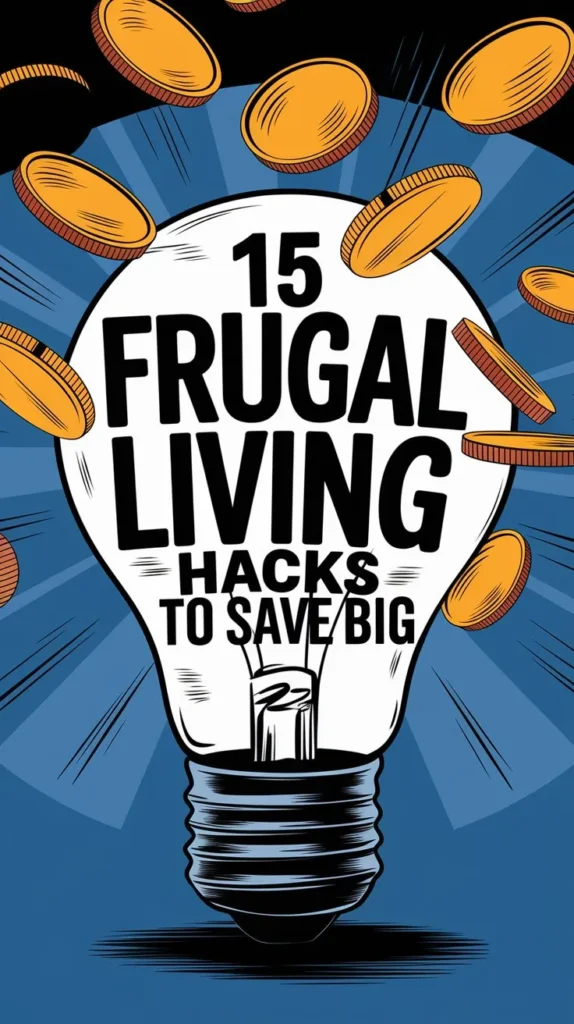
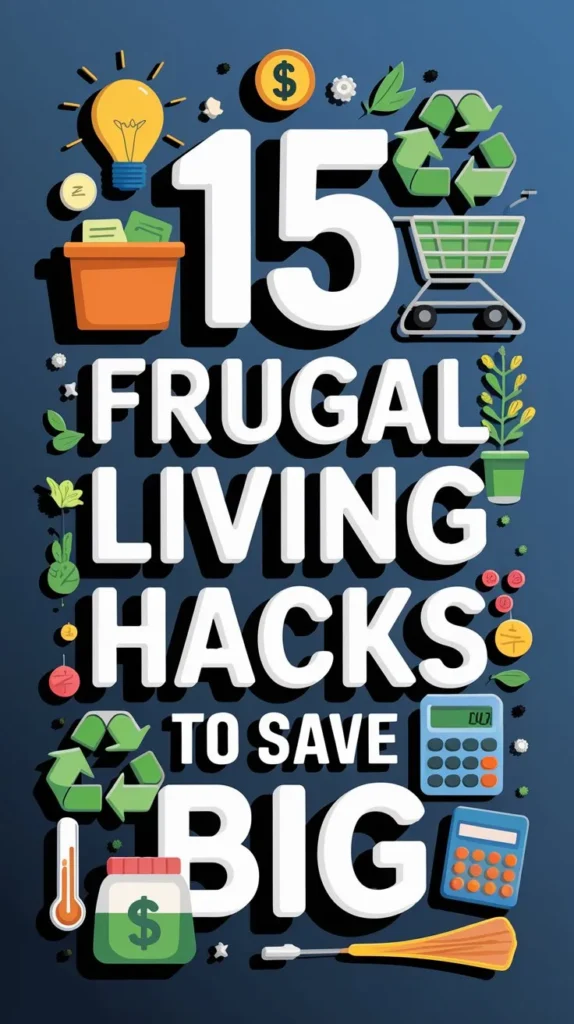
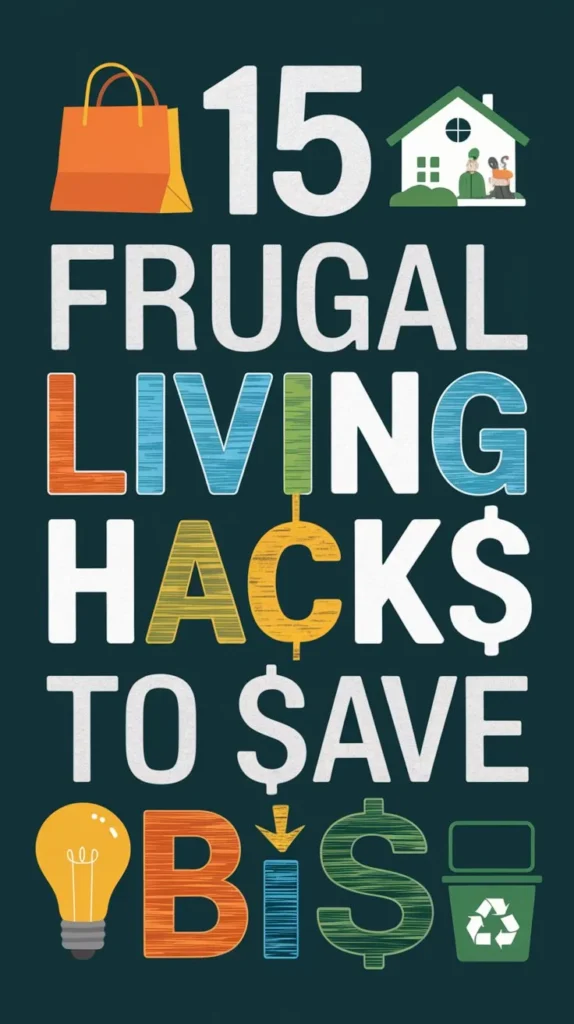
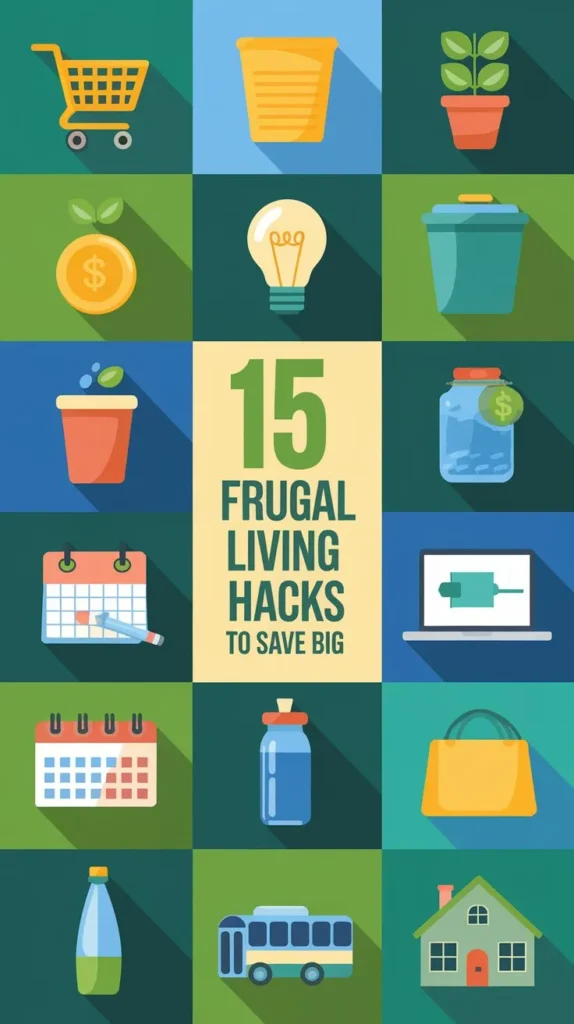
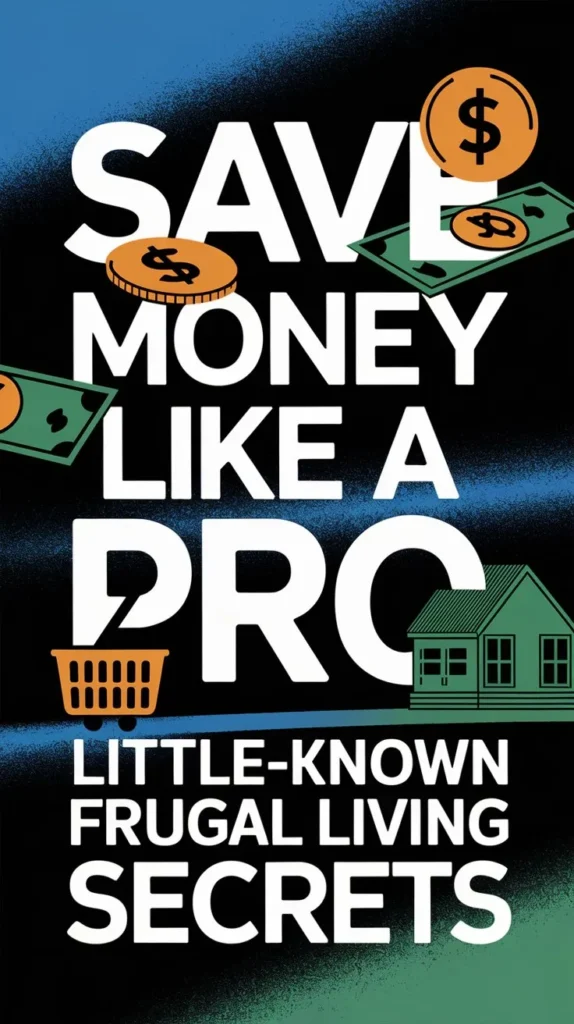


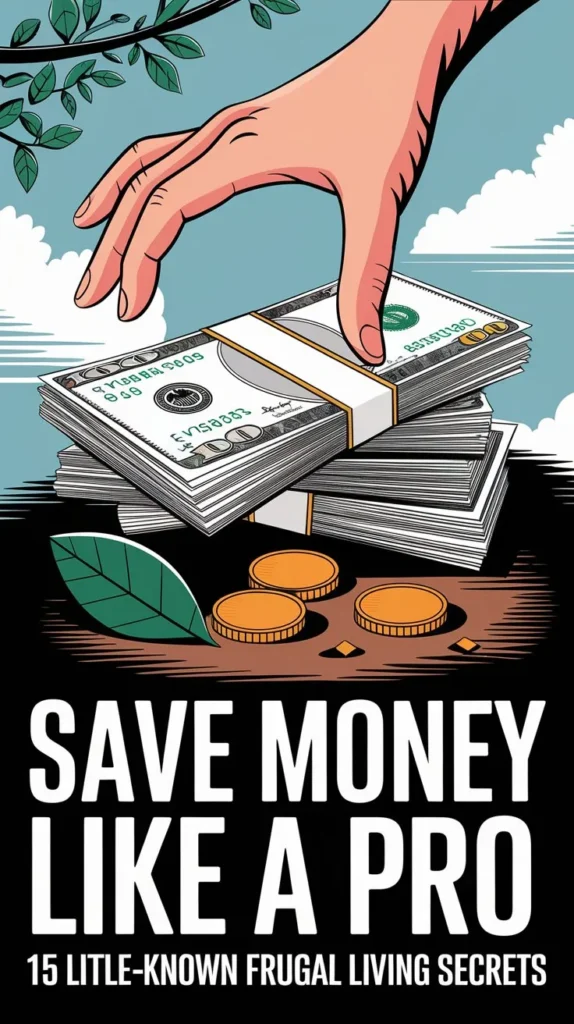
Last update on 2024-12-22 / Affiliate links / Images from Amazon Product Advertising API. Some of the links on this website are affiliate links, which means that at no additional cost to you, I earn a commission if you click through and make a purchase. I only recommend products and services that I believe will add value to my readers. Thank you for your support!









